
-
Hitta rätt mat för ditt husdjurGör det här testet för att se vilket foder som kan vara bäst för din pälskling.Hitta rätt mat för ditt husdjurGör det här testet för att se vilket foder som kan vara bäst för din pälskling.Utvalda produkter
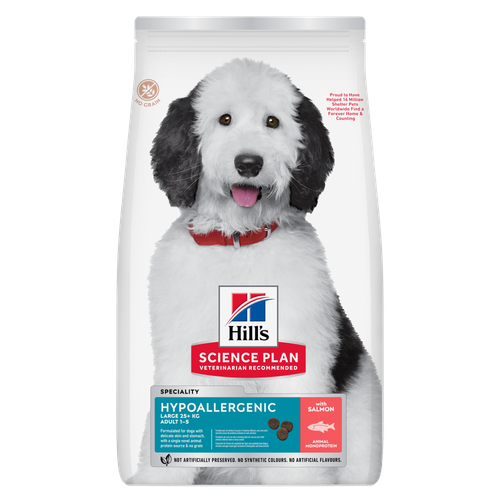 Hypoallergeniskt hundfoder för vuxna hundar med lax
Hypoallergeniskt hundfoder för vuxna hundar med laxHILL'S SCIENCE PLAN Hypoallergenic Large Breed Adult hundfoder med lax är ett komplett foder för vuxna hundar av stora raser i åldern 1–5 år. Det är särskilt framtaget för hundar med känslig hud och mage, med begränsade mängder högkvalitativa och nya proteinkällor samt utan spannmål.
Handla nu Hypoallergenic Adult Hundfoder
Hypoallergenic Adult HundfoderHill's Science Plan Hypoallergenic Adult våtfoder med lax är ett komplett helfoder av högsta kvalitet för alla vuxna hundar från 1 år och uppåt. Detta läckra våtfoder i burk är speciellt sammansatt för hundar med känslig hud och mage. Den innehåller en enda animalisk proteinkälla och är spannmålsfri.
Handla nu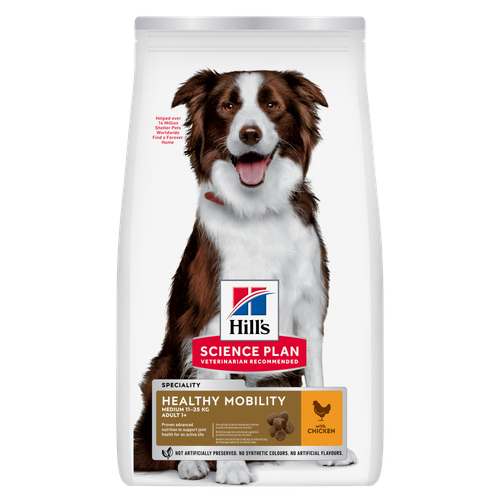 Healthy Mobility Medium Adult Hundfoder
Healthy Mobility Medium Adult HundfoderHill's Science Plan Healthy Mobility Medium Breed Adult Hundfoder med kyckling erbjuder en avancerad nutrition för att stödja ledhälsa och förbättra rörligheten. provides advanced nutrition to support joint health and improve mobility.
Handla nuHälsotillståndUtvalda produkter Sterilised Kattungefoder
Sterilised KattungefoderHill's SCIENCE PLAN Sterilised Kitten kattungefoder är skapat med Hill´s unika förståelse för de specifika behov som kastrerade kattungar har. Det bidrar med hög proteinkvalitet för muskelutveckling, med kontrollerat fett för att förebygga risk för övervikt efter kastrering. Dessutom har det en unik blandning av antioxidanter för att främja ett hälsosamt immunsystem för att stöjda din kattunges tillväxt.
Handla nu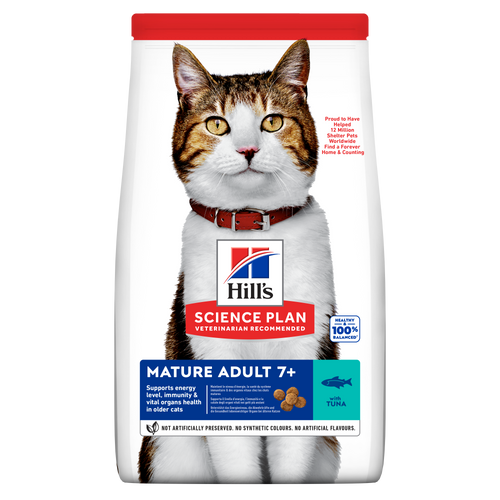 Mature Adult Kattfoder
Mature Adult KattfoderHill's Science Plan Adult kattfoder med lax är ett helfoder för äldre katter, speciellt utformat med ActivBiome+ Multi-Benefit teknologi.
Detta foder främjar ett värdigt åldrande hos katter och innehåller en synergistisk blandning av ingredienser som bidrar till att upprätthålla energi- och aktivitetsnivån.Handla nu Hill's Science Plan SENIOR VITALITY KATTFODER Kyckling, med laxHandla nu
Hill's Science Plan SENIOR VITALITY KATTFODER Kyckling, med laxHandla nu -
Till hundägare
- Tips och artiklar
-
Hälsokategori
- Vikthantering
- Miljö- och foderöverkänslighet
- Urinvägar
- Matsmältning
- Leder
- Njurar
-
Hundens livsstadium
- Näring för valpar
- Näring för vuxna katter
- Näring för seniorer
Till kattägare- Tips och artiklar
-
Hälsokategori
- Vikthantering
- Hud- & foderöverkänslighet
- Urinvägar
- Matsmältning
- Njurar
-
Kattens livsstadium
- Näring för kattungar
- Näring för vuxna
- Näring för seniorer
Utvalda artiklar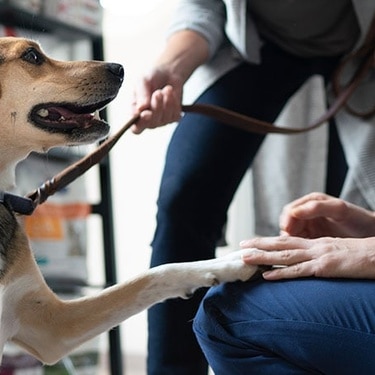 Viktförändringar hos hundar och katter - kan det vara ett sköldkörtelproblem?
Viktförändringar hos hundar och katter - kan det vara ett sköldkörtelproblem?En viktförändring kan tyda på ett problem med sköldkörteln. Läs mer om tecken, orsaker och vad du kan göra åt det.
Läs mer Virtual Vet Visits: What You Need to Know
Virtual Vet Visits: What You Need to KnowLearn the ins and outs of a televet appointment before you talk to a vet online.
Läs mer Kristaller och stenar i hund- och katturin
Kristaller och stenar i hund- och katturinLäs om orsaker till och behandlingar av kristaller i hund- och katturin för att bibehålla hundens eller kattens hälsa. För expertråd om urinvård, besök Hill's Pet Sverige.
Läs mer -


Like people, dogs often experience failing eyesight as they get older—and need a "seeing eye" just as you would. Caring for a dog who is losing his vision (or who's already gone blind) can offer a special set of challenges for the rest of the family. But a loss of eyesight certainly doesn't mean a poor quality of life, especially for pet parents who are willing to adjust how they care for their impaired canine.
Common Causes
Dogs can go blind for a number of reasons, from disease to old age. Some of the most common reasons for blindness in dogs are cataracts, glaucoma, progressive retinal atrophy, and suddenly acquired retinal degeneration (also known as SARDS).
Certain breeds and sexes are also more susceptible to blindness. Middle-aged female dogs, for instance, are especially prone to SARDS, which causes blindness quite suddenly. Dachshunds, miniature schnauzers, and mutts are at higher-than-average risk for the disease as well, according to research reported on by PetMD. Cataracts, meanwhile, are more common in miniature poodles, cocker spaniels, miniature schnauzers, golden retrievers, Boston terriers, and Siberian huskies.
Beta Carotene
Good nutrition is vital to your dog's health and can help keep his vision healthy in some cases, although SARDS and similar vision-impairing conditions have no known treatment or approach to prevention.
But, beta carotene can help a dog's vision. According to Pet360, several foods that are healthy for both of you, such as carrots and cantelope, are known to strengthen a dog's vision and reduce the chances of cataracts. Look for dog food that lists beta carotene in its ingredients — Hill's® Science Diet®, for example.
Necessary veterinary care will vary depending on what's causing your dog's blindness. Along with beta carotene, your vet might suggest seeing a veterinary ophthalmologist, which may be more expensive than routine care. When searching for this specialist, a good place to start is an online directory kept by your country's veterinary ophthalmologist professional organization, such as American College of Veterinary Ophthalmologist (ACVO).


Smakrika tips
Valpar kan behöva flera besök under sitt första år för vaccinationer. Vuxna hundar har i allmänhet nytta av årliga kontroller, medan seniora hundar eller hundar med särskilda behov kan behöva mer frekventa besök.
Living with a Blind Dog
Many volunteer organizations are actually dedicated to helping blind and visually impaired dogs by adopting them from various shelters. If you have a blind or visually impaired dog, you can reach out to these volunteer organizations for advice. Here are some helpful tips to get you started:
- Put tags or bells that jingle or make noise on other animals in the house — and consider wearing one yourself — so that your blind dog knows where his companion is.
- Teach your dog commands such as "watch," as observed by the nonprofit Best Friends, to make him aware he's approaching a hindrance. Consider "step" as well, to teach him when a stair is in front of him.
- Get down on your dog's level to look for things in your home that could harm him. Sharp table corners, for instance, could harm your dog if he approaches too quickly.
- Help put together a routine for him; this could include the trip from his bed to his food, the back door, and his favorite napping spot. Keep these pathways void of any obstacles to make it easier for him to get around. When taking him outside, you might need to keep him on a leash to guide him to his favorite spots to do his business. After time, his other senses will strengthen and help him be able to do this routine behavior on his own.
- Help him stay active. Just because your dog is visually-impaired doesn't mean he can't have fun and play. Much like a seeing-eye dog would do for a visually impaired person, you can help guide your dog along with a leash. Make sure to keep the leash short so you can better direct him where to go. It's also nice to let him sniff around and take in his surroundings through smell. It's a small gesture, but one he'll be sure to appreciate. You can also help him play. Find an open, safe area for him to be able to run around in like a backyard and play fetch with dog toys that make a noise. Through his sense of smell and hearing, he will eventually be able to track down the ball, and as you call to him to bring it back he'll use those same senses to come back to you.
There's no doubt that the care of blindness in dogs will take some special effort. But with love and time, both of you can adjust to this natural condition. Just because your dog cannot see as he used to, doesn't mean his quality of life has to suffer. Continue to show him the same love and affection that you always have and he will return the favor.


Kara Murphy är frilansskribent och hundägare som bor i Erie, Pennsylvania. Hon har en goldendoodle som heter Maddie.
Relaterade produkter

Hill's Science Plan Healthy Mobility Medium Breed Adult Hundfoder med kyckling erbjuder en avancerad nutrition för att stödja ledhälsa och förbättra rörligheten. provides advanced nutrition to support joint health and improve mobility.

HILL'S SCIENCE PLAN Hypoallergenic Large Breed Adult hundfoder med lax är ett komplett foder för vuxna hundar av stora raser i åldern 1–5 år. Det är särskilt framtaget för hundar med känslig hud och mage, med begränsade mängder högkvalitativa och nya proteinkällor samt utan spannmål.

Hill's Science Plan Hypoallergenic Adult våtfoder med lax är ett komplett helfoder av högsta kvalitet för alla vuxna hundar från 1 år och uppåt. Detta läckra våtfoder i burk är speciellt sammansatt för hundar med känslig hud och mage. Den innehåller en enda animalisk proteinkälla och är spannmålsfri.
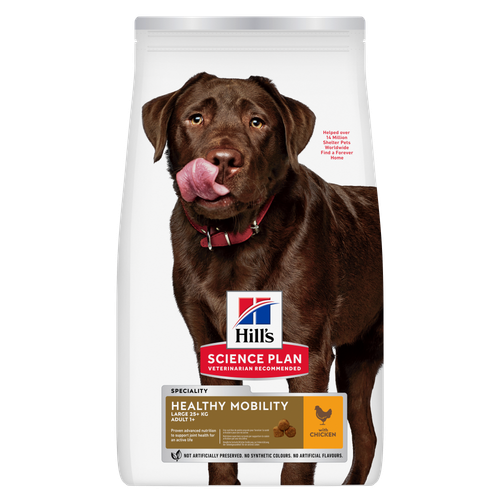
Hill's Science Plan Healthy Mobility Large Breed Adult Hundfoder med Kyckling erbjuder en avancerad nutrition för att stödja ledhälsan och förbättra rörligheten.
Relaterade artiklar

Just like every other pet owner, vets are responsible for giving their pets the best possible nutrition, exercise and care needed to keep them healthy and happy.
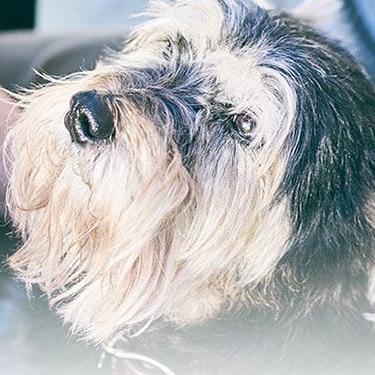
Though it may seem like your four-legged friend loves nothing more than to nap on the couch, dogs need regular exercise to stay healthy just like people do.

Hundar kan lida av känslig mage och är då benägna att utveckla problem med matsmältningen. Vissa raser kan dessutom vara mer känsliga än andra.
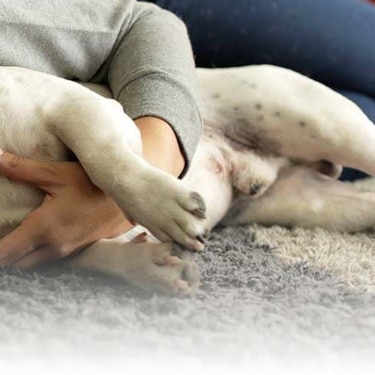
Signs of a healthy dog include healthy skin and a healthy coat. This article provides information on the appearance of a healthy coat, the importance of grooming, brushing, bathing and nutrition in the care of maintaining a healthy dog.

Sätt din hund på diet utan att den märker det
Vår kalorifattiga sammansättning hjälper dig att kontrollera din hunds vikt. Den innehåller högkvalitativt protein för att bygga slanka muskler och är tillverkad med noggrant utvalda ingredienser för en smakrik och näringsrik måltid. Kliniskt bevisade antioxidanter, vitamin C+E, bidrar till ett friskt immunsystem.
Sätt din hund på diet utan att den märker det
Vår kalorifattiga sammansättning hjälper dig att kontrollera din hunds vikt. Den innehåller högkvalitativt protein för att bygga slanka muskler och är tillverkad med noggrant utvalda ingredienser för en smakrik och näringsrik måltid. Kliniskt bevisade antioxidanter, vitamin C+E, bidrar till ett friskt immunsystem.

